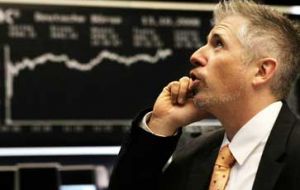MercoPress. South Atlantic News Agency
Technically recession is over in the US, but even Obama was cautious
 The data is impressive but much of it is based on “fiscal steroids”
The data is impressive but much of it is based on “fiscal steroids” The United States economy grew at an annual pace of 3.5% between July and September, its first expansion in more than a year. The growth was helped by a substantial government spending plan, including a scrappage scheme to boost car sales.
The official figures released Thursday indicate recession has technically ended, but some economists think there could be further setbacks.
President Obama said while “welcome news”, the US was still a “long way” from recovering from the “deepest downturn since the Great Depression”.
“This is affirmation that this recession is abating and the steps we've taken have made a difference, but I also know that we've got a long way to go to fully restore our economy.”
Mr Obama said there were other benchmarks for measuring economic progress, such as “whether we are creating jobs, whether families are able to pay their bills and whether businesses are hiring and doing well.”
Compared with the previous three months, the US economy grew by 0.9%. In the same period, and on the same measure, the UK economy stayed in recession after it shrank by 0.4%. Japan, China, Germany and France have recently climbed out of recession.
BBC chief economics correspondent Hugh Pym said the 3.5% annualised growth rate - which takes the change over a three-month period and works out what it would be if it continued over a year - was better than had been expected by most commentators.
“The sheer scale of the stimulus in the US has made a big difference, it was much bigger in percentage terms than that in the UK,” he said.
It is the first time the US economy has expanded since the second quarter of 2008, when it grew at an annual pace of 2.4%. But US Treasury Secretary Timothy Geithner stressed times were still hard for millions.
“Unemployment remains unacceptably high for every person out of work, for every family facing foreclosure, for every small business facing a credit crunch, the recession remains alive and acute,” he said.
Official confirmation of whether the US is in or out of recession will come from the National Bureau of Economic Research, the agency which considers a number of factors in coming to its decision.
The figures from the Commerce Department showed that a number of factors helped to lift the economy during the third quarter.
Spending on durable manufactured products soared at an annualised rate of 22.3%, the highest quarterly amount since 2001, led primarily by the impact of the cash for clunkers scheme lifting car sales.
The housing market also improved, with spending on housing products up 23.4%, its largest quarterly jump in 23 years. Analysts said this big leap was sparked by the government's 8,000 US dollars tax credit for first-time house buyers.
Meanwhile, total government spending was up 7.9%, as the wider stimulus spending continued to take effect. In addition, exports were also up strongly, increasing 21.4%, the biggest rise since 1996.
“It's good to have the economy growing again,” said Brian Bethune, economist at IHS Global Insight. “But we don't think that rate of growth is sustainable because it is distorted by all the government stimulus.
”The challenge here is to get organic growth - growth that isn't helped by fiscal steroids.“
Analysts cautious about the slow nature of the US economic recovery point to the fact that the unemployment rate currently stands at 9.8%, and that the labour market traditionally lags behind any wider economic recovery.
They also highlight the fact that the big car firms have already reported a sharp fall in September sales following the conclusion of the popular 3 billion US dollars cash for clunkers scheme at the end of August.
”You can say that the recession is over, but it sure won't feel like that,“ said Dean Baker, co-director of the Centre for Economic Policy Research.
”There is a lot of downward momentum that isn't going to go.”




Top Comments
Disclaimer & comment rulesCommenting for this story is now closed.
If you have a Facebook account, become a fan and comment on our Facebook Page!